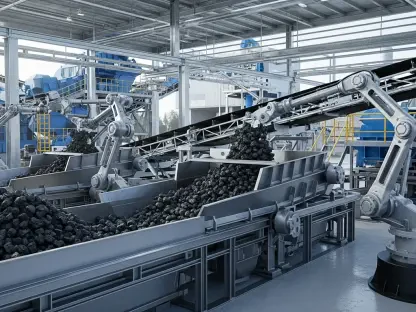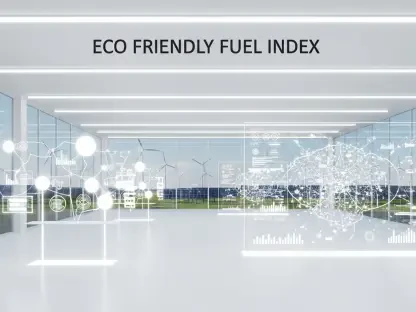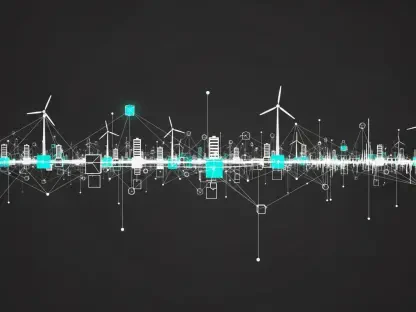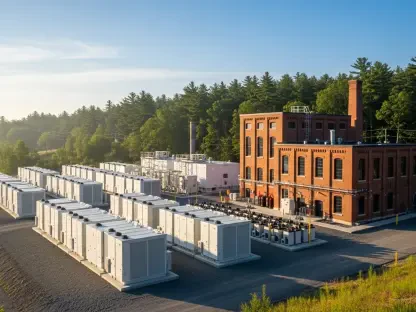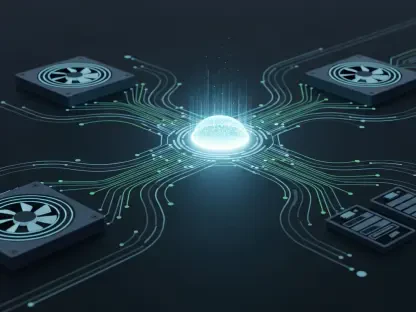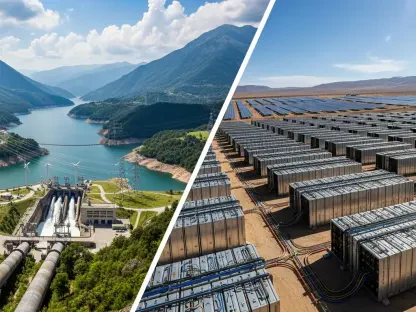In a world increasingly driven by the urgent need for sustainable solutions, the industrial sector faces mounting pressure to reduce emissions and energy costs, especially in the most grueling environments like mining and construction, where heavy machinery operates under extreme conditions. Scania, a renowned leader in transport solutions, has stepped up to this challenge with a groundbreaking announcement. The company has expanded its electrification portfolio by introducing a new division dedicated to industrial batteries, specifically designed for off-road applications. Headquartered in Sweden, this initiative targets heavy-duty sectors that operate under extreme conditions, promising a transformative approach to powering machinery. With a focus on integrating advanced battery systems and electric powertrains, Scania aims to address the unique demands of these industries, paving the way for cleaner and more efficient operations. This development marks a significant milestone in the journey toward electrification, highlighting a shift that could redefine industrial practices globally.
Pioneering Off-Road Electrification Solutions
Scania’s latest venture into industrial batteries is a strategic move to cater to the growing demand for electric solutions in off-road environments, such as mining, construction, and material handling. This new division, built on the foundation of a recent acquisition of expertise in industrial electrification, offers a robust portfolio that includes battery systems, electric motors, software, and connectivity solutions. Two primary product platforms, named Core and Compact, have been introduced to streamline electrification across diverse applications. These platforms support capacities ranging from 21 to 624 kWh and voltages up to 1000 V, ensuring flexibility for various industrial needs. Manufactured in Europe with key facilities in Gdańsk, Poland, and a research hub in Stockholm, Sweden, these products are engineered for durability and high performance. The emphasis on sustainability and uptime reflects Scania’s commitment to delivering reliable solutions that can withstand the toughest operational challenges faced by industrial sectors.
Beyond the hardware, Scania provides comprehensive support services that guide customers from initial concept to after-sales care, ensuring seamless integration of electric powertrains into existing machinery. This holistic approach is critical in addressing the complexities of transitioning from traditional combustion engines to electric systems, particularly in environments where downtime is not an option. The compatibility of these new battery systems with Scania’s existing electric components accelerates development and deployment for original equipment manufacturers (OEMs) and end-users alike. By fostering close partnerships with industry stakeholders, Scania ensures that its solutions are not only innovative but also tailored to meet specific operational requirements. This dedication to customization and efficiency positions the company as a frontrunner in driving the adoption of electric machinery in demanding terrains, ultimately contributing to significant energy savings and a reduced environmental footprint across industrial landscapes.
Addressing Industry Challenges and Trends
The shift toward electrification in industrial sectors is fueled by a dual need for cost efficiency and environmental responsibility, particularly in energy-intensive operations. Scania recognizes the hurdles associated with this transition, including the demand for high-capacity batteries and precisely engineered electric machines that can handle specific power, voltage, and thermal constraints. To tackle these challenges, the company has developed a suite of electric powertrain components designed to optimize performance while minimizing ecological impact. The rapid adoption of electrified equipment in heavy industries underscores the potential for substantial long-term emissions reductions, a benefit that Scania’s solutions aim to maximize. By focusing on practical, high-performing systems, the company addresses the real-world needs of operators who require reliable machinery in harsh conditions, ensuring that sustainability does not come at the expense of productivity or operational effectiveness.
Moreover, the market trend toward electrification is not just a passing phase but a necessary evolution for industries operating in rugged settings. Scania’s leadership in this space is evident through its extensive experience, having delivered thousands of battery systems with over 12 million operating hours across mining, construction, and agricultural applications. This track record demonstrates a deep understanding of the diverse needs within industrial sectors, allowing for modular and compact designs that facilitate integration across various platforms. The company’s focus on tailored solutions ensures that its offerings are both forward-thinking and adaptable, meeting the unique demands of different applications. As industries continue to prioritize greener practices, Scania’s strategic emphasis on innovative electrification sets a benchmark for how heavy-duty sectors can embrace sustainable technologies without compromising on the power and reliability essential for their operations.
Leadership Vision and Strategic Growth
Insights from Scania’s leadership highlight the company’s ambition to spearhead the electrification of off-road applications with a blend of agility and engineering prowess. Gustaf Sundell, Executive Vice President and Head of Ventures and New Business at Scania, has emphasized the powerful synergy between the newly established division and the company’s global network, which together accelerate sustainable transitions in challenging environments. This vision is complemented by a commitment to leveraging extensive expertise to deliver cutting-edge solutions that redefine industrial efficiency. The strategic expansion into industrial batteries not only broadens Scania’s scope but also reinforces its role as a key player in electrification across multiple sectors, including buses, trucks, and now off-road machinery. This integrated approach ensures that advancements in one area can inform and enhance developments in others, creating a cohesive ecosystem of electric solutions.
Elin Åkerström, CEO of the industrial batteries division, has further underscored the pivotal role of batteries as more than mere energy storage units, viewing them as critical systems that influence overall performance and reliability. This perspective drives Scania’s dedication to supporting customers throughout the entire lifecycle of their electrification journey, from design to deployment and beyond. With a focus on high-quality systems for applications like industrial forklifts and excavators, the company ensures that its solutions meet the rigorous demands of off-road operations. The leadership’s unified stance on innovation and customer-centric service reflects a broader strategy to position Scania at the forefront of sustainable industrial transformation, fostering confidence among stakeholders that electrification can deliver both environmental benefits and operational excellence in even the most demanding scenarios.
Reflecting on a Sustainable Milestone
Looking back, Scania’s introduction of industrial batteries marked a pivotal moment in the push for electrification within off-road industrial sectors. This initiative tackled the intricate challenges of transitioning to electric solutions in some of the harshest working conditions, delivering a comprehensive range of products from battery systems to full powertrains. The focus on energy efficiency, emissions cuts, and operational dependability aligned seamlessly with the industry’s shift toward sustainable practices. Through strategic moves and innovative platforms, Scania established itself as a leader in both on-road and off-road electrification, setting a high standard for cleaner, more efficient technologies. Moving forward, industries should consider leveraging such integrated solutions to balance performance with environmental goals, while policymakers and stakeholders might explore incentives to further accelerate adoption. This step by Scania not only enhanced its offerings but also inspired a broader dialogue on how industrial sectors could sustainably evolve in the years ahead.


